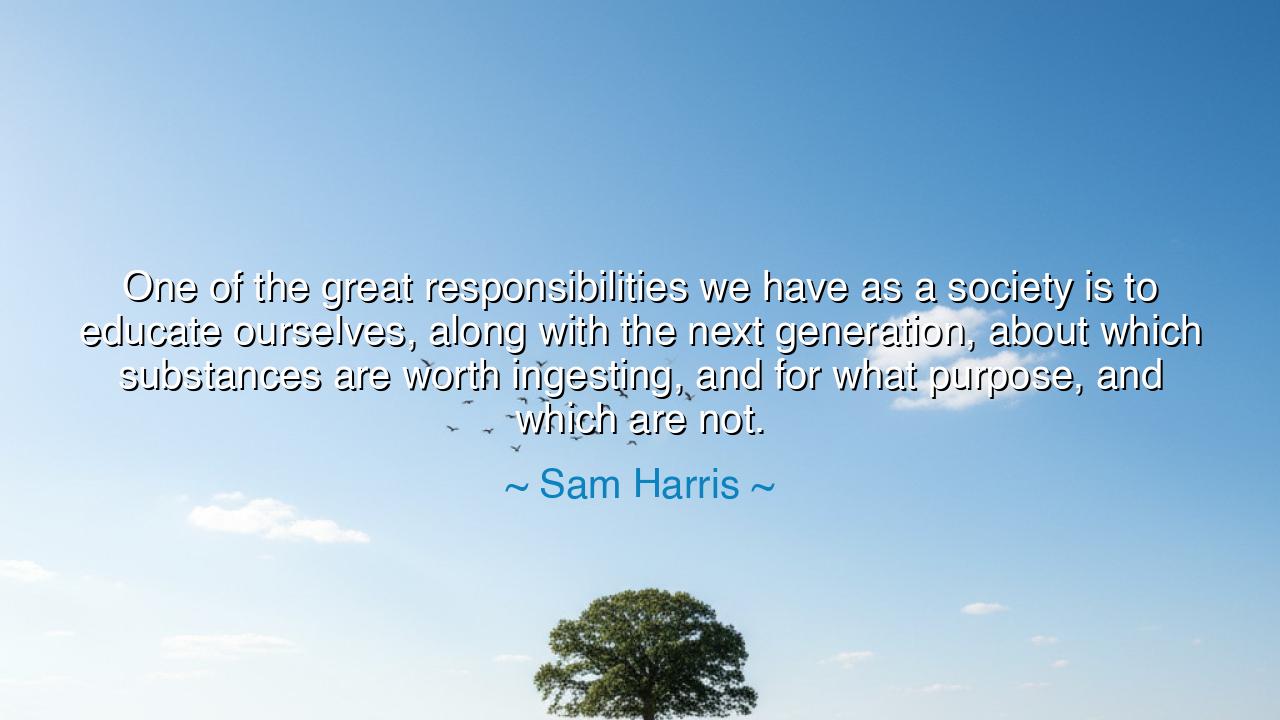
One of the great responsibilities we have as a society is to
One of the great responsibilities we have as a society is to educate ourselves, along with the next generation, about which substances are worth ingesting, and for what purpose, and which are not.






Hear the words of Sam Harris, which strike like a clear bell through the confusion of our age: “One of the great responsibilities we have as a society is to educate ourselves, along with the next generation, about which substances are worth ingesting, and for what purpose, and which are not.” These words carry both warning and guidance, for they touch upon a truth as old as humankind itself: that what we take into our bodies can heal or destroy, awaken or enslave, uplift or degrade. To forget this truth is to walk blindly into ruin; to remember it is to preserve both body and spirit.
For man has always lived at the threshold of temptation. The earth offers herbs and medicines, yet also poisons hidden in leaves and roots. Fire itself can warm or burn, and so too do substances offer both salvation and peril. Thus, Harris reminds us that the path of wisdom is not in blind prohibition or reckless indulgence, but in education—the careful weighing of purpose, consequence, and necessity. Only through knowledge can a society distinguish between what sustains life and what corrodes it.
Consider the tale of the coca leaf among the ancient Andean peoples. To them, it was not a curse but a sacred gift, chewed to endure the heights of the mountains, to ease labor, to bind communities in ritual. Yet when this leaf was stripped of its context, refined into cocaine, and cast into the hands of a profit-driven world, it became a scourge, shattering lives and nations. Here lies the wisdom of Harris’s words: without education—without an understanding of what is worthy, what is dangerous, and why—a tool of life becomes an instrument of death.
Or think of the Opium Wars of the nineteenth century, when a great empire was brought low by addiction. The people of China, deprived of knowledge and exploited by foreign merchants, fell prey to a flood of opium. A substance once used sparingly for medicine became the chain of millions. Entire families withered; entire provinces weakened. Here again, the absence of education—the failure to discern purpose and boundary—led to the collapse of strength, dignity, and independence.
The wisdom in Harris’s teaching is that ignorance is itself the greatest poison. A society that hides from truth, that refuses to speak plainly about substances—whether alcohol, tobacco, medicines, or narcotics—invites both misuse and misunderstanding. The young, unprepared, stumble into traps that knowledge could have revealed. To educate is not to encourage destruction, but to guard against it. It is the shield we pass to the next generation, so they may walk with eyes open and choices clear.
The lesson, then, is this: every generation must face anew the question of what it means to live well. We cannot pretend that temptation does not exist, nor can we banish it with silence. Instead, we must speak, learn, and teach. We must honor the healing power of medicine, while warning of the chains of addiction. We must distinguish between use and abuse, between wisdom and folly. This is not only a personal duty—it is the responsibility of all who belong to a society.
Therefore, O listener, let your actions be these: seek knowledge, not ignorance, in what you place within your body. Teach your children not with fear alone, but with truth. When you partake of food, drink, or medicine, ask: does this serve life, or diminish it? When you encounter others in error, guide them with compassion, not scorn. For if we honor this teaching, we shall build a society that is not enslaved by its appetites, but strengthened by wisdom, and in that strength, each generation shall rise freer and more whole than the last.






AAdministratorAdministrator
Welcome, honored guests. Please leave a comment, we will respond soon